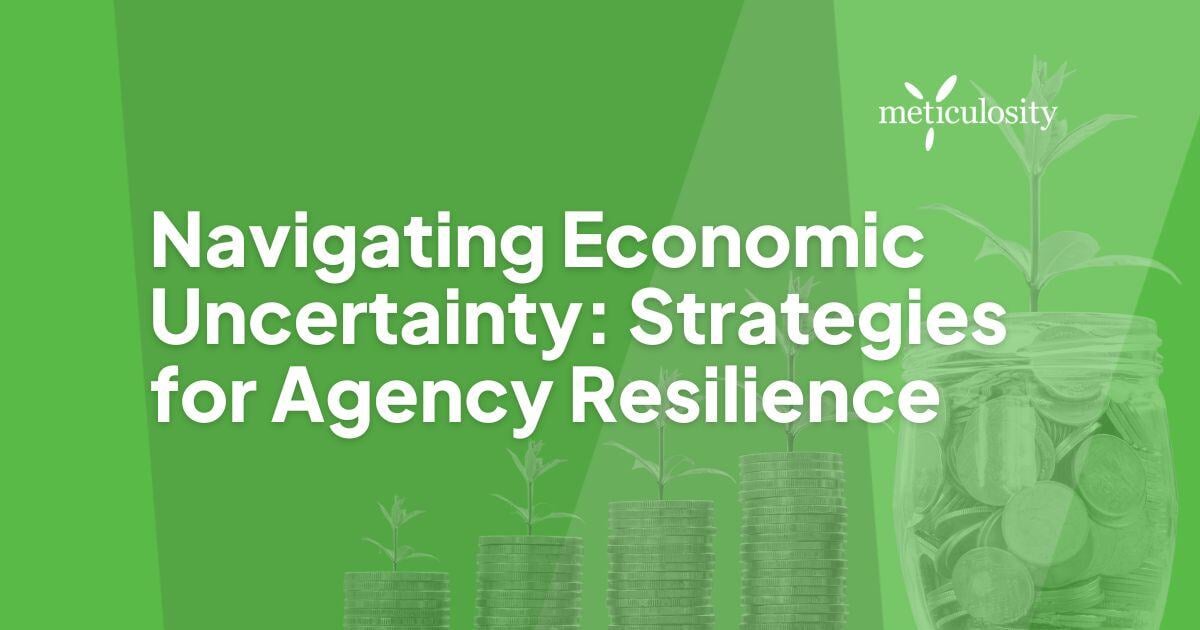Economic uncertainty can disrupt even the most well-established agencies. Whether due to inflation, shifting client priorities, global events, or industry downturns, unpredictability poses real challenges. When budgets tighten, businesses reevaluate their marketing spend, making it crucial for agencies to demonstrate their value, optimize operations, and future-proof their services.
But uncertainty doesn’t have to mean instability. Agencies that implement resilience-focused strategies can not only weather economic storms but also come out stronger. This guide will explore key areas agencies should focus on to maintain financial stability, retain clients, optimize operations, and adapt marketing efforts. With the right approach, agencies can transform challenges into opportunities and position themselves for long-term success.
If your agency needs additional support to stay agile and efficient, explore our White Label Services to scale operations without the overhead of full-time hires.
Strengthening Financial Foundations
The first step in building agency resilience is ensuring financial stability. Without a strong financial backbone, any market fluctuation can threaten business continuity. Agencies must take a proactive approach to financial management, ensuring they have the resources to navigate downturns while maintaining profitability.
Assessing Cash Flow and Expenses
A comprehensive financial health check is essential. Agencies should analyze their cash flow, identify unnecessary expenses, and optimize budgets. Tools like financial forecasting software can help predict revenue fluctuations, allowing for better decision-making.
Building a Financial Cushion
One of the most effective ways to prepare for uncertainty is by maintaining an emergency fund. Ideally, agencies should have enough savings to cover at least three to six months of operating expenses. This provides a buffer against client cancellations or unexpected drops in revenue.
Shifting to Retainer-Based Models
Relying on one-off projects can make revenue streams unpredictable. Agencies should consider shifting toward retainer-based contracts, where clients pay a fixed monthly fee for ongoing services. This ensures a steady income and long-term client commitments, reducing financial risk.
Enhancing Client Relationships and Retention
During economic downturns, client retention becomes more critical than ever. Clients are more cautious with their spending, and agencies must reinforce their value to avoid being seen as an expendable cost.
Proactive Communication Builds Trust
Uncertainty can create anxiety for clients, making transparency essential. Agencies should regularly update clients on industry trends, new opportunities, and cost-effective solutions. Positioning the agency as a strategic partner rather than just a service provider strengthens client relationships and increases retention.
Offering Flexible Solutions
Clients facing budget constraints may consider cutting back on agency services. To prevent this, agencies should offer flexible solutions, such as scalable pricing, phased project implementations, or bundled services. This allows clients to adjust their level of engagement without completely ending their contracts.
Focusing on Value-Driven Services
Agencies should ensure that their work directly contributes to their clients’ bottom line. Emphasizing high-ROI strategies, such as conversion-focused marketing, lead generation, and automation, makes it easier for clients to justify continued investment in agency services.
Optimizing Operational Efficiency
Operational inefficiencies can drain resources, making agencies more vulnerable during tough economic periods. By optimizing workflows and leveraging automation, agencies can maintain productivity while reducing costs.
Leveraging Automation and AI
Investing in AI-powered tools and automation can significantly enhance efficiency. Platforms like HubSpot streamline lead nurturing, reporting, and campaign execution, reducing manual workloads and allowing teams to focus on strategic growth.
Eliminating Inefficiencies
Agencies should conduct internal audits to identify process bottlenecks. Are there redundant approvals slowing down projects? Is the team bogged down by manual data entry? Optimizing workflows, standardizing processes, and implementing automation tools can drastically improve efficiency.
Utilizing Fractional Staffing and White Label Services
Rather than hiring full-time employees in uncertain times, agencies can leverage White Label Services to outsource specialized tasks. This approach keeps costs flexible while maintaining high-quality service delivery.
Adapting Marketing and Sales Strategies
When economic conditions shift, so must an agency’s marketing and sales approach. Clients are more selective with their investments, so agencies must refine their messaging and adjust their pricing models to align with current market realities.
Positioning the Agency as a Trusted Partner
Agencies that provide educational content and thought leadership can build stronger credibility. Publishing case studies, hosting webinars, and sharing success stories demonstrate how the agency helps businesses thrive even in challenging times.
Adjusting Pricing Models
Rigid pricing can be a barrier during economic uncertainty. Agencies should consider flexible models, such as tiered pricing, pay-for-performance structures, or value-based pricing, making it easier for clients to commit.
Focusing on High-Impact Lead Generation
Traditional lead generation methods may not be as effective during downturns. Agencies should double down on high-ROI strategies like inbound marketing, LinkedIn networking, and SEO-driven content marketing to attract prospects with strong buying intent.
Investing in Team Resilience and Culture
A resilient agency isn’t just about financial health—it’s also about fostering a strong, engaged team. Employees who feel valued and supported are more productive and motivated, which is crucial in challenging times.
Transparent Communication Matters
Keeping employees in the loop about financial health, business strategies, and operational changes fosters trust and reduces uncertainty. When employees understand the agency’s direction, they feel more secure and engaged.
Encouraging Professional Development
Continuous learning helps teams stay ahead of industry changes. Agencies should provide training opportunities in AI, automation, and emerging marketing trends to ensure their workforce remains competitive.
Maintaining a Positive Work Culture
Workplace morale can suffer during uncertain times. Agencies should prioritize team-building activities, mental health support, and a culture of recognition to keep employees motivated and committed.
Staying Agile and Future-Proofing the Agency
Agencies that continuously adapt are better equipped to handle uncertainty. Instead of reacting to market changes, they should proactively plan for the future.
Keeping Up with Industry Trends
Regularly monitoring industry trends and shifts in consumer behavior allows agencies to adjust their strategies before they become outdated. Subscribing to industry reports, joining professional communities, and analyzing competitor movements provide valuable insights.
Developing Contingency Plans
Preparing for multiple economic scenarios is crucial. Agencies should develop contingency plans for budget adjustments, staffing changes, and client retention efforts to ensure long-term stability.
Focusing on Innovation
Innovation drives long-term growth. Agencies should explore new service offerings, leverage AI-driven marketing strategies, and experiment with emerging technologies to stay ahead of the curve.
Conclusion
Economic uncertainty is a challenge, but it also presents opportunities for growth and innovation. By strengthening financial foundations, prioritizing client relationships, optimizing operations, refining marketing efforts, and fostering a resilient team culture, agencies can not only survive challenging times but emerge stronger.
A key to long-term success is adaptability. Agencies that remain flexible, embrace automation, and continuously refine their strategies will stay competitive, no matter the economic climate.
If your agency is looking for additional support to scale without increasing overhead, explore our White Label Services. Our expert team helps agencies stay agile, efficient, and profitable, even in uncertain times.
Frequently Asked Questions
1. How can agencies maintain stability during economic downturns?
Focus on financial efficiency, diversify revenue streams, retain key clients, and optimize internal processes to reduce costs.
2. What are the best ways to retain clients during uncertain times?
Offer flexible pricing models, demonstrate clear ROI, strengthen relationships through proactive communication, and provide high-value services.
3. How can agencies diversify revenue streams?
Expand service offerings, introduce subscription-based models, explore white-label partnerships, and develop digital products like templates or courses.
4. What role does automation play in agency resilience?
Automation reduces operational costs, streamlines repetitive tasks, and improves efficiency, allowing teams to focus on strategy and client relationships.
5. How can agencies future-proof their business?
Stay agile, invest in upskilling teams, embrace emerging technologies, and build a strong financial buffer to navigate market fluctuations.
6. What should agencies prioritize when budgets tighten?
Retaining existing clients, refining core offerings, improving operational efficiency, and focusing on high-ROI marketing efforts.







